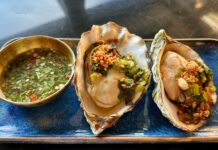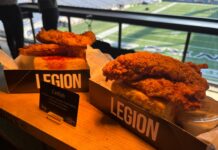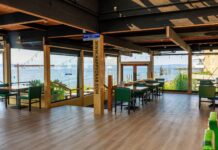
Gordon Bowker, an entrepreneur most known for co-founding Starbucks but who also founded Redhook Brewing during a long and eventful career, has died at the age of 82, reports the Seattle Times.
Bowker was a uniquely Seattle character. According to a history of Starbucks’ early years, he was born in Oakland, California, but after his father died in a World War II submarine, his mother moved them to Seattle to live with her parents, who were “Norwegian immigrants who had taken part in the Alaska gold rush before settling in Ballard.” He went to college at the University of San Francisco, where he met one of his future Starbucks co-founders, Jerry Baldwin, and then moved back to Seattle, where he worked as a cab driver, Underground Tour guide, and editor at the original Seattle magazine.
In 1971, Baldwin, Bowker, and third co-founder Zev Siegl opened the first Starbucks location (Bowker came up with the name). It didn’t serve drinks but sold coffee beans sourced from Peet’s along with tea and spices. Initially, Bowker kept his day job at an ad agency while working in the shop on weekends. (He also earned some publicity by sending some free beans to a Seattle Times columnist.) Starbucks struggled throughout the ’70s, then, in 1982, it hired Howard Schultz as director of marketing. Schultz pushed the company to focus on selling espresso drinks, and, after briefly leaving to start another coffee company, bought Starbucks with the help of investors in 1987. (To this day, Schultz is sometimes incorrectly referred to as the founder of Starbucks.)
In a 2008 interview with the Times, Bowker complained that people asked him too often about the founding of Starbucks. And he certainly did a lot more than just that. For years he was on the board of Peet’s, which Starbucks owned briefly in the ’80s. He encouraged the journalist David Brewster to start Seattle Weekly and wrote restaurant reviews for it under a pseudonym. And in 1981 he founded Redhook Brewery, one of the country’s first microbreweries.
“In 1981, there was no roadmap, no playbook,” wrote Kendall Jones at the Washington Beer Blog. “The world was thoroughly dominated by the biggest beer companies, which were growing through mergers and acquisitions. Even regional breweries like Rainier were too small to survive and were gobbled up by bigger fish, which in turn were gobbled up by even bigger fish. But a few weirdly creative fish were hatching new ideas and swimming against the current.”
Bowker is linked to another moment in Seattle beer history: Before starting Starbucks, he founded an advertising firm with Terry Hecker, and that firm went on to produce the delightfully weird Rainier Beer ads in the ’70s and ’80s that featured “herds” of “wild Rainiers,” aka huge beer bottles with legs. The commercials were so iconic that years later, they inspired a documentary.
In the 2008 Times interview, Bowker attributed his success in part to a “contrarian” streak. He saw opportunities in fields where everybody else saw problems. He treasured the sensation of figuring out that “something’s been overlooked.”
Baldwin told the Times that Bowker, who was a lifelong friend, “really was able to feel the pulse, or maybe the pre-pulse, of the zeitgeist of the moment. … He could see what was coming, and it was just part of his wiring. He wasn’t looking for it, it was just there.”
He also may have had an instinct to be a little bit of what we would today call a troll. For many years (ending in 2012) Alaska Airlines handed out prayer cards with meals, a practice that struck Bowker as odd. He told the Times in 2008: “What’s the idea of putting a prayer on there? Please don’t crash? God help us, don’t crash?” So he read the prayers out loud.
“I also was curious what kind of effect that would have,” he said. “The flight attendants didn’t like it at all.”




